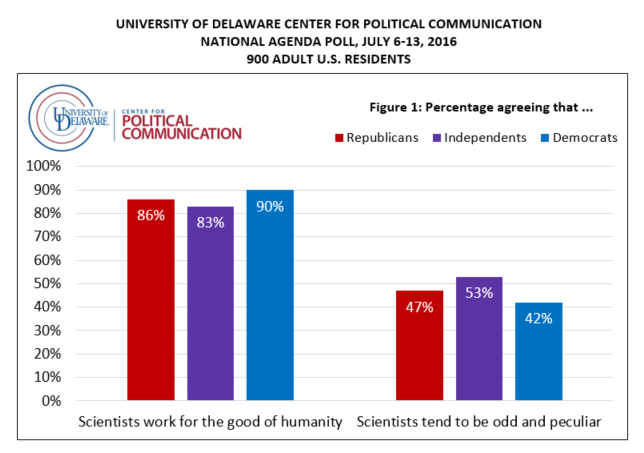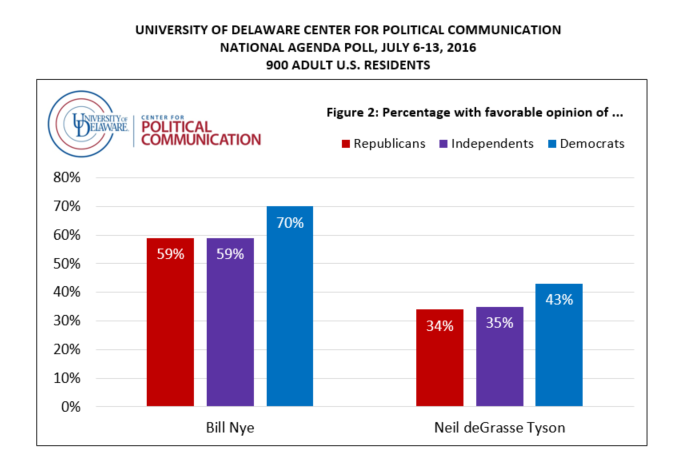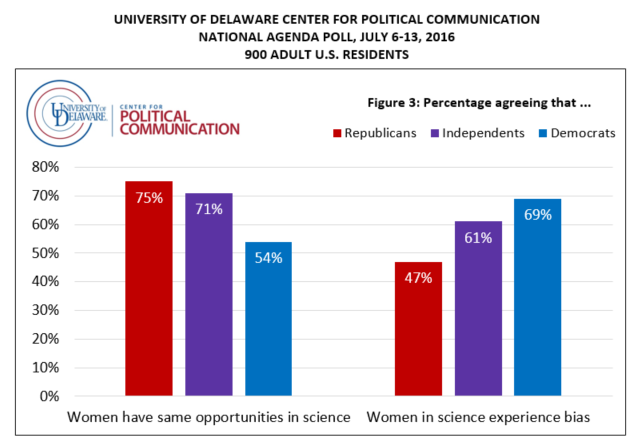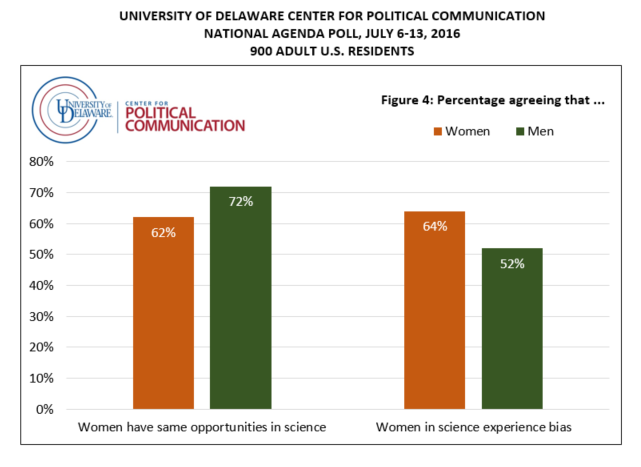National survey shows divides in perceptions of scientists
Most Americans have favorable views of scientists

August 5, 2016 — Science is a prominent topic in the 2016 presidential campaign, with Hillary Clinton proclaiming, “I believe in science,” in her July 28 nomination acceptance at the Democratic National Convention.
A national survey by the University of Delaware’s Center for Political Communication, conducted in July 2016, shows that most Americans have favorable views of scientists. Fully 84% of those surveyed agree that scientists are dedicated people who work for the good of humanity, while only 14% disagree. Fewer than half (47%) agree that scientists tend to be odd and peculiar people, whereas 50% disagree.
Yet there is a party divide in perceptions of scientists. Among Democrats, 90% agree that that scientists are dedicated people who work for the good of humanity, with 53% strongly agreeing. Among Republicans, 86% agree with this, but only 43% strongly agree.
Most know celebrity scientist Bill Nye

Also, 47% of Republicans agree that scientists tend to be odd and peculiar, compared to 42% of Democrats. Independents hold the least favorable views of scientists, with 83% agreeing that scientists are dedicated people who work for the good of humanity and 53% agreeing that scientists tend to be odd and peculiar.
A clear majority of those polled (60%) hold favorable views of Bill Nye, “the Science Guy,” with only 19% viewing him negatively (21% had no opinion). Respondents also view astrophysicist and talk show host Neil deGrasse Tyson more positively (38%) than negatively (23%), though 38% had no opinion about him. Democrats have more favorable opinions about Nye and Tyson than either independents or Republicans. Fully 70% of Democrats view Nye favorably, and 43% view Tyson favorably. Meanwhile 59% of Republicans and independents view Nye favorably. Slightly more than a third of Republicans (34%) and independents (35%) view Tyson favorably. Both Nye and Tyson have spoken out publicly about topics such as evolution and climate change.
Divergence in views about bias against women in science

Americans are divided in how they view opportunities for and bias against women working in science. Two-thirds (67%) of those surveyed agree that women have the same opportunities as men to succeed in science, with only 30% disagreeing. At the same time, a substantial majority (58%) agree that women who work in science are likely to experience bias based on their gender, with 36% disagreeing.
Republicans (75%) are much more likely than Democrats (54%) to agree that women have the same opportunities as men to succeed in science. Meanwhile, Democrats (69%) are much more likely than Republicans (47%) to agree that women working in science experience gender bias.
More women than men perceive bias

There is a clear gender gap in perceptions of opportunities for and bias against women working in science. Fully 72% of men agree that women have the same opportunities as men to succeed in science, compared to 62% of women. Meanwhile, women (64%) are more likely than men (52%) to agree that women working in science experience bias based on their gender.
About the study
The National Agenda Opinion Project research was funded by the University of Delaware’s Center for Political Communication (CPC) and the William P. Frank Foundation. The study was supervised by the CPC’s Director, Paul Brewer, a professor in the Departments of Communication and Political Science & International Relations.
Results are based on telephone interviews with a representative national sample of 900 adult U.S. residents. Telephone interviews were conducted by landline (450) and cell phone (450, including 253 without a landline phone). The survey was conducted under supervision of the Center for Political Communication by Princeton Survey Research Associates International. The data were collected from July 6-13, 2016. Statistical results are weighted to correct known demographic discrepancies. The margin of sampling error for the complete set of weighted data is – 4.2 percentage points.
Readers should be aware that in addition to sampling error, question wording and practical difficulties in conducting surveys can introduce error or bias into the findings of public opinion polls.
Please contact Paul Brewer at (302) 831-7771 for more details about the survey’s methodology.
